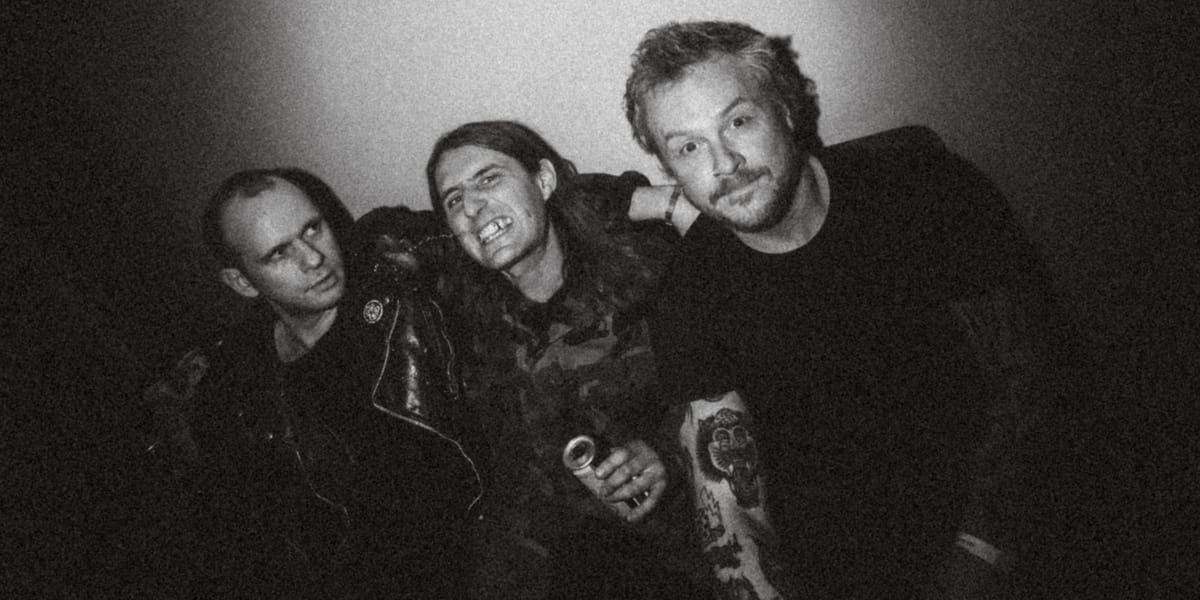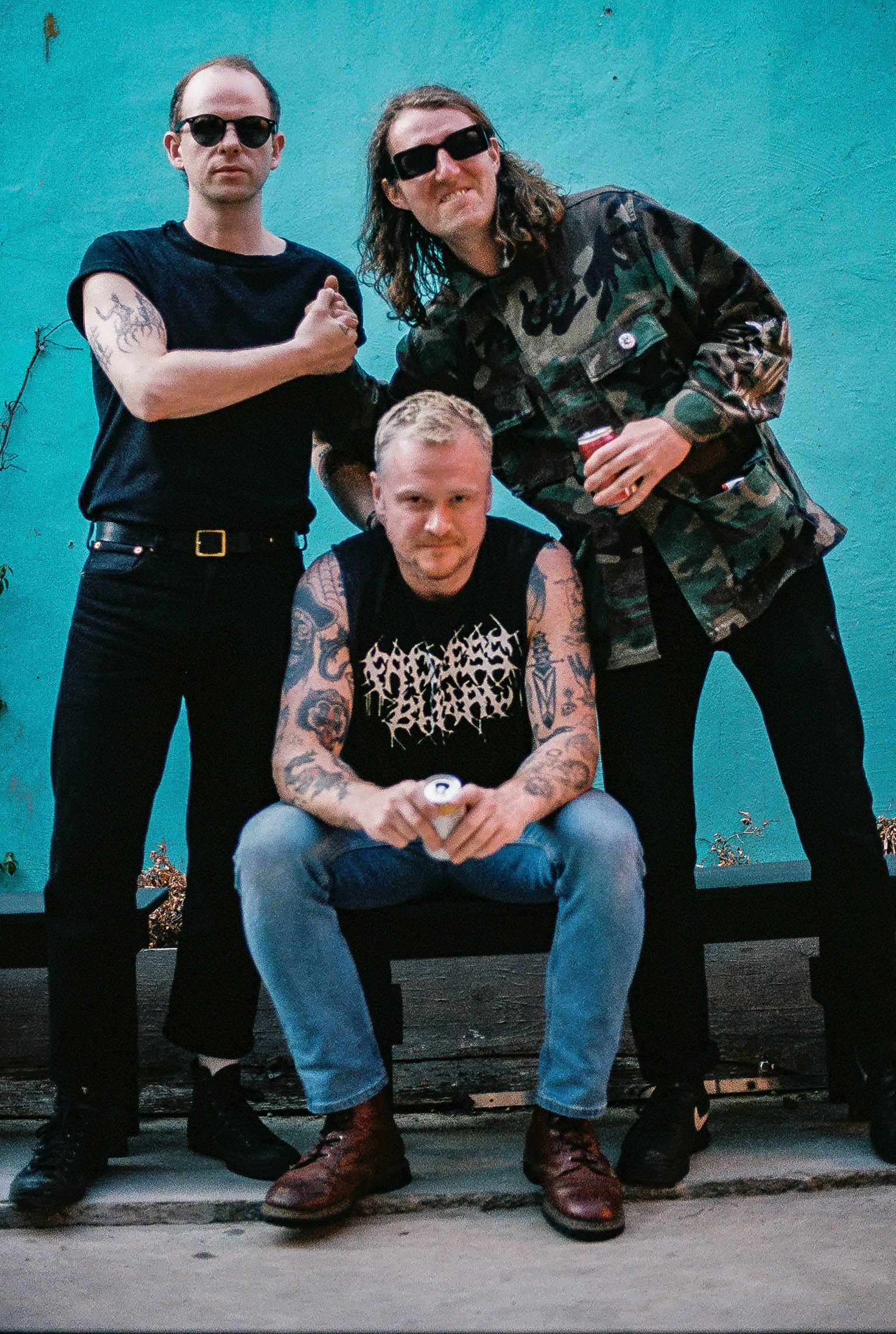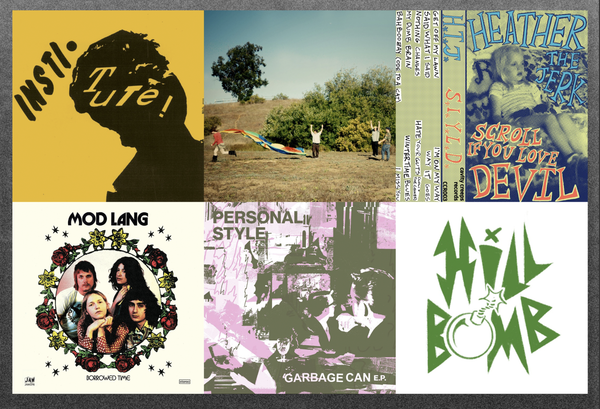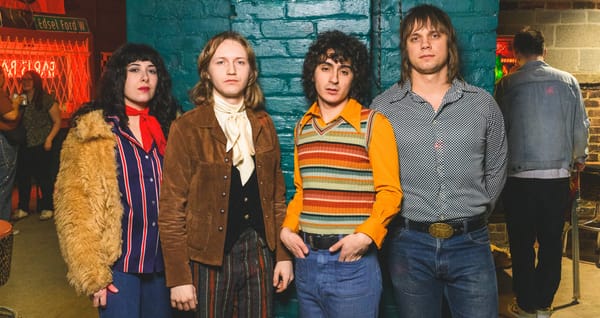pyrex think concept albums should be reserved for prog bands
The New York City punks discuss the Bodies exhibition’s influence on their new album Body + using steel chairs as percussion.

“Pummeling” is the only appropriate word for Pyrex. Listening to their music at full volume—again, the only appropriate way—feels like getting kicked in the stomach. Attending one of their blistering live shows is akin to, as vocalist Joe Hardwick shouts on Body standout “Vertebrae,” getting “rocked with a shovel.” Body (their newest album, released in March on the vaunted Total Punk Records), plays like 16 minutes of fists flying at you from every direction. And what’s really more punk than a 16-minute LP that sort of feels like getting jumped?
Following 2023’s self-titled debut and a slew of seven-inch singles, Body is the culmination of years of alchemy, striving to blend hyper-rhythmic hardcore with pitch-black post-punk (back when that term actually had a discernible aesthetic). Hardwick plays guitar like he’s punching the shit out of a speed bag and shreds his throat with a purely primal shout. The rhythm section of bassist Graham Arbon Elrich and drummer Steven Fisher strike an ideal balance of heft and precision. Their ability to switch from a mid-tempo stomp to a double-time crunch is the musical equivalent of Swiss engineering. Their new 7” Slugman is out Friday from La Vida Es Un Mus Discos.
The album is also the product of spending a little more time on the songs to get them closer to the band’s initial vision for them. “That was very much intentional,” says Hardwick of the process. “ The first LP, I think we did that in three days and they were three very long days, you know, starting at the morning and going until 3am or later sometimes. But this one, I believe we wanted to take our time to really focus on tone and, just like—I don't know, it sounds silly to say or redundant, but—make the best record we possibly could.”
After a recent rehearsal, with blood and adrenaline pumping from fine-tuning their songs, the members of Pyrex set up a laptop in their practice space so all three of them could participate in our interview. We spoke about the trio’s formation, their creative evolution, how Body was an important part of that evolution, and much more.

Here’s something I've always wanted to know: Why did you choose the name Pyrex? Because I’m used to hearing the name Pyrex associated with rappers, and learning there was a punk band named Pyrex is what piqued my attention.
Graham Arbon Elrich: I would say pretty much the same. Yeah. Joe and I both grew up in Atlanta. Fisher actually came up with it. We were sitting around, I wanted to call the band Lexicon.
Steven Fisher: We were just like spitballing names, sitting around at a friend's house. There were like ten of us there that night. I think just hanging out and just [saying] whatever [name] came to our minds, spitballing—and I said Pyrex, 'cause Pyrex is, it's just like a cool word. It's got all the cool letters in it. Very, um, but immediately I was like, no, maybe not. And I wasn’t aware of—
Graham: Immediately, Joe and I were like, “Fuck yeah.”
Joe Hardwick: We both were in high school during like the early [2000s] when Gucci Mane and Young Jeezy and T.I. were starting to take over the Atlanta rap scene.
Tell me about the Atlanta punk scene around the time when the two of you were out there going to shows and stuff.
Graham: Fucking awesome. Really good time to grow up.
Joe: I first started stepping into that world [in my] late teens, early twenties—it’s a golden era of Atlanta punk. I feel like every night of the week there was a great show going on and once I was about 20 or so, I started to participate myself and started my first band. That's how Graham and I met; back in 2010 or ‘11 maybe.
Graham: The first time I was around Joe, if I remember correctly, maybe we had been around each other like once or twice before, but I think it was like my 18th birthday, like Joe had this house show with the band Wild Thing from the Bay. It was just on after that. I had a band with these two brothers and their cousin was in a band with Joe. So we played small shows together, but to speak more about the Atlanta scene and less about us, at that point, GG King was getting fired up and Brian Bell started Scavenger of Death Records, and all that stuff is still all my favorite stuff. I still listen to it all the time.
Joe: Predator was a huge one for me. That was my favorite punk band in Atlanta. And then, [when] I was like 22, I got to be in that band briefly. I felt like Marky Mark in the movie Rockstar, like it was crazy to me with you guys. We reconnected when I moved to New York in 2018. That's how I met Fisher. [He and Graham] were friends, and [Graham] lived here for a number of years before I moved up here.
Graham: We bartended in the same neighborhood, like a block away from each other. You know how bartenders hang out after work and they have booze at the bar that they worked at? So I'd always go and like run down with cans of beer and be like “lemme get some shots” and trade.
Was there a specific sound that you were all going for at the beginning as Pyrex? Did you have an idea of what you wanted this band to sound like before you actually got into a room and started playing?
Joe: Well, initially I think I was leaning more towards the gothy, post-punk sound [for] some of the original Pyrex tunes. I went into it with the intention of it being tough, yet accessible, I guess. Like, tough post-punk with pop sensibility. I feel like even the angriest, toughest punk bands in the world, my favorite ones have riffs or hooks that will just stick in your head because it's inherently catchy regardless of how distorted or angry it might seem. And so that was always something I was conscious of and trying to bring to fruition, I guess.
Fisher: I grew up listening to a lot of Australian post-punk, noise rock, grungy kind of stuff. And I always was a big fan of British bands like Wire and the Fall, [bands with] a lot of really in-the-pocket drums with out-there guitar. I think that's probably what drew me to Pyrex when we started playing together; why I enjoyed it so much. 'Cause it was like a nice mix. And as a drummer I also like playing fast stuff too, so it's being in a band where you get to mix slower stuff in the pocket with weird guitars and drum and bass locked in. And then also you get to go a bit nuts sometimes as well. Like that balance between post-punk and proper punk and hardcore stuff. I think it's, rather than just being pigeonholed down one path, it's good to be able to like hop back and forward, right?
Joe: I’m not sure if I’ve ever hit this mark, but [the ideal vibe is] Bauhaus meets Poison Idea.
Oh, I love that.
Joe: [I was] probably leaning more towards the Bauhaus side of things initially. Now we've gone the other way into the tougher stuff, but [it] still has some of that ethereal creepy menace behind it.
Not a lot of bands use the singles format to their advantage nowadays, at least at least compared to back in the day. What is your approach: Is it to try new ideas or do you have self-contained ideas that only work in the 7” format?
Joe: It was partially happenstance because this was like “these two songs,” or “these three songs,” or however many, were written close together in time, and so the five of them are similar. And whether that's intentional or not, I can't really say. I don't consciously think about that stuff, but if we have a group of songs that are cohesive and have a [conversation] with one another, I think that's subconsciously why they will just be a three-song seven-inch.
Fisher: It is important not to be too precious about what you pick and choose. I really like the idea of writing 15 songs and releasing 10 of 'em. [The process is ideally to] write eight songs, do a record, write four songs, do an EP just, keep it going. It helps for continuity’s sake, too.
Graham: I also just love 7-inches as a format, like massive fan. It seems like less and less labels want to do them for just like practical, financial reasons. I think there's less plants that are making them, it seems—and it does suck that it's not as cheap as it used to be, 'cause 7-inches cost like $12 [retail] now. But we try to keep it, we try to keep it a dollar an inch. I think that's a good match. We did “Touch” [b/w] “Conditioner,” our first single, but those songs [are ones] we re-recorded and put on the first LP. And I think GG King would do several versions on different releases. I think that used to be a lot more common than music in general.
You spoke of the self-titled album. Looking back on that, what are you most proud of and what are some of the things you wish you could change, if anything?
Joe: I can't speak for the three of us, but personally—yeah, hindsight's 20/20, but maybe I would've sat with it for a little bit longer. 'Cause there are certain songs that are a bit of a head-scratcher compared to others. I still like all the songs, but I think that we were more just gassed up about being a band and putting things out. And so we were like, “We got our record’s worth of stuff. Let's just do it.”
Graham: I describe that record sometimes as “the first eight songs we wrote.”
Fisher: I do think it's a cool album. Like it's a good representation of early us. I would say the new record feels more fully formed, but I do really like the first record. There was no overthinking it or whatever. We just wrote the songs and put 'em out and I think that's like what we were saying about the 7”. That's the whole point, at least personally [for me], it's: “Make music, release music.” That's the fun part. It's like, you can look back on it and be proud of it, or you can look back on it and regret it, but I wouldn't change having done it.
Is that the biggest difference between the self-titled album and Body? That you felt like you had more time to write these songs? To just stay on them and tweak them a little bit if you need to?
Joe: The biggest difference is with the second record, it was more of a conscious decision to lean into the tougher side of our sound. After I'd come up with the skeleton again, the first few songs on that record, we sensed a similar sound between them and just tried to keep going down that road deliberately as opposed to, “Okay, I got a new idea for a song and this is it.” It was more trying to tie the whole composition together.
Fisher: A couple of the titles, before the idea of Body existed, just happened naturally. A couple of the titles—we were all just talking about it one day. “Vertebrae” was the first one.
Joe: And “Face Off” came second.
Fisher: There was like a conversation around cones, but I don't think “Cones” was named cones because of like rods and cones in your eye, but we bent it that way.
Joe: Yeah, that one was a bit of a stretch, but it works. [laughter] There was definitely some lyric-tweaking in the studio [because] we can't just have seven of these [songs] reference anatomy. I think the idea of a concept album should be like, reserved for prog bands, so I wouldn't put that label on it, but it speaks to the whole motif in that product. It helps to glue the composition together.
Graham: I think [Total Punk founder] Rich [Evans] did a pretty good job describing it. “A 16-minute crash course on Human Anatomy led by Jeffrey Dahmer.”
Joe: When I was in high school, I took an anatomy course my freshman year of high school, we went to the Bodies exhibit. Which was like a traveling anatomy/science museum exhibit in like 2004 or ‘05. That poster of the bisected body with like the muscle tissue and all that on one side and the skeletal stuff on [the other] definitely was the inspiration for the art. Once we had three or four of these songs written and the titles as such, it just fell together that way naturally.
Tell me about recording Body. Where did you record it? How long did it take? What was the process for you all emotionally?
Joe: We recorded it at Daisy Chain Studios. A good friend Ian Rose runs Daisy Chain in Sunset Park. We recorded the first LP there, as well as a handful of other tracks. But this time around, we set out to not rush ourselves. It was a whole week and then I came back for some vocal [over]dubs even after the fact.
Fisher: We trust [Ian] and he is really good at what he does. So he had some ideas around like production stuff that he wanted to try out and you can't really tell, but there's some auxiliary stuff in there, like the weird percussion things. At one point I was playing a steel chair with some mallets and like you can hear it in “Reflex.” [You can hear us] whacking [stuff] on the stairwell banister, and metal chains.
Graham: I think [our] first LP was like the first thing he reported at his studio. Once he got it set up.
Joe: Yeah, I remember the first [day] we had to go out, like day one, we were all just miserable 'cause it was summertime and there wasn't really any air conditioning to speak of. And this is a 50-plus-year-old building. But the second day we had to go to Lowe’s, you get like an air conditioning unit. It took up a bit of our afternoon, so it was crunch time when we got back.
Both of your full-lengths were released through Total Punk. What made you all want to stick with Rich for the release of Body?
Fisher: He was like really into it, and Graham always says that it's it's good to work with people that wanna work with you. And I think that's very true. And putting two records out on the same label also—there's some value in that. I think that you're not just bopping around all the time. I've known Rich for a long time. He has always been a good dude and [is] committed to putting out good music and works hard to support the greater music community in that way.
Graham: All those stamped [records] and stuff. I've got boxes of 7-inches that are, you don't see 'em as much as you see the ones on the shelves, but like I was going through my 7-inches one time, I was like, oh my God, I have so many fucking Total Punk releases from those days. Because you'd see ‘em [while] flipping through records and I just automatically just pull them out. Maybe [I didn’t] know who they were necessarily, but I [was] like, “Yeah, it's Total Punk. It's gonna be good.”
Two of my favorite bands, Pyrex and Tyvek, still standing. Still got their names strong. [laughter] Have you gotten any cease-and-desists?
Fisher: Still waiting on that? They would fucking never, I think there’s something going on with the company. I think they filed bankruptcy at some point. They’ve got bigger fish to fry at the moment.
Graham: There’s a producer or a rapper that releases stuff under [the name] Pyrex, but I feel like he’s much more commercial. So if he’s fine, we’re fine.




